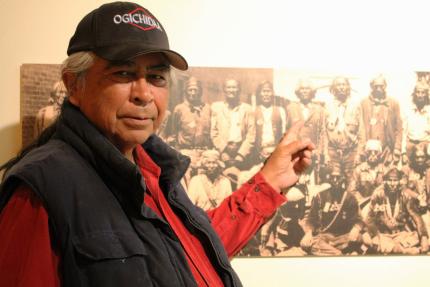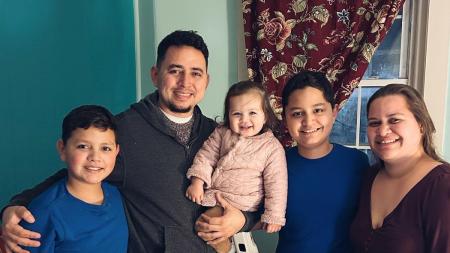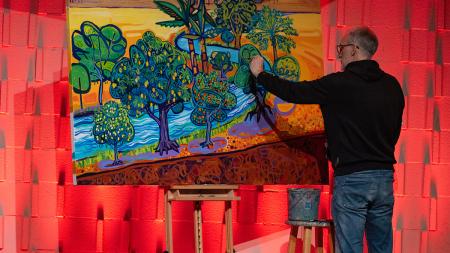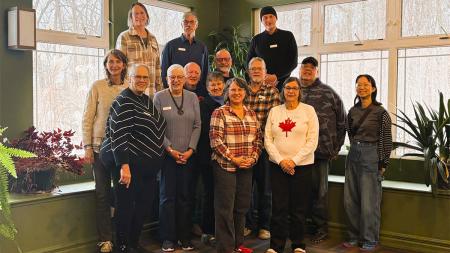Discussing a Painful History

Navajo elder Ted Charles points to a photo of his grandfather.
Viviana Cornejo
Tension hung in the air as Native American and European-descent members of the Christian Reformed Church discussed their thoughts after doing the Blanket Exercise in the sanctuary of Rehoboth CRC in Rehoboth, N.Mex.
During the Blanket Exercise, participants were given a challenging historical overview of relations in North America between Indigenous and non-Indigenous people. That involved a look at the Doctrine of Discovery (DOD), the topic of a controversial task force report that Synod 2016 will be addressing next month.
Included in the group at the Rehoboth CRC were Navajos who were either former students of Rehoboth Christian School, located in Rehoboth, when it was a boarding school, or family members or friends of those who attended the school.
Also on hand were people of European descent who had a connection to CRC missionaries who had taught at the school—and who have been criticized in the DOD task force report for not respecting the culture of Native American students.
“Overall, [the Blanket Exercise] went well,” said Rudy Gonzalez, a race relations advocate for the CRC’s Office of Race Relations who helped lead the event.
“But it was a little scary having two cultures, two different ways of looking at the world, come together for the exercise and the debriefing afterwards.”
On each side, said Gonzalez, participants had concerns, but they had the chance to talk about them.
“They were able to grasp some of the history as to why this happened and to talk about these things together,” he said. “The exercise opened up the conversation and seemed to be therapeutic.”
It took a handful of meetings over six months with members of Classis Red Mesa, where several Native American CRC congregations are located, before they could agree on holding the Blanket Exercise at Rehoboth CRC and another one at Bethel CRC in Shiprock, N.Mex., said Gonzalez.
Especially playing into the tension about offering the exercises was the DOD task force report, which describes ways in which Europeans came to North America over the centuries and claimed the land and resources as their own. See this post on the Network for more information.
The church councils at Rehoboth CRC and Zuni CRC have sent communications to synod, asking it to withhold action on the task force report until further study can be done.
The Doctrine of Discovery Task Force report says that the missionaries treated Native Americans unfairly by doing such things as requiring students attending Rehoboth to cut their hair and give up other aspects of their traditional culture.
At the same time, the report does not exclusively focus on Rehoboth, but argues that attitudes of European superiority represented in this doctrine were and are pervasive in North America and have contributed to the devaluing of Indigenous lives and cultures. The task force includes both First Nations and Native American members.
While the church councils in Classis Red Mesa don’t necessarily disagree with the DOD report, they are critical that those who wrote the DOD report didn’t get the whole story of the ministry in New Mexico.
“People in Red Mesa were hesitant about holding the Blanket Exercise because the Doctrine of Discovery report had been circulating and they knew it would be part of the exercise,” said Gonzalez.
But they eventually worked through their concerns, and Classis Red Mesa agreed to hold the Blanket Exercise in April. During the exercise, people gathered on blankets arranged on the floor.
As someone read the history of how Europeans came to North America and forced Native Americans from their ancestral lands, blankets were folded and put away, creating less and less space on which those representing Indigenous peoples could stand.
At Rehoboth, many participants brought handmade blankets that they used in the exercise, after which the blankets were given away and some were taken to be used for the event in Shiprock.
During the debriefing period, also referred to as a sharing circle, people at Rehoboth who were connected to CRC missionaries offered their thoughts on what happened and why. Meanwhile, those Native Americans with ties to Rehoboth spoke about the pain students endured and yet, said Gonzalez, some expressed gratitude for the work of CRC missionaries.
In the sharing circle, along with hearing stories and experiences discussed by Navajo elders and others, learning also came “through the hospitality and welcoming heart of the Navajo brothers and sisters,” said Viviana Cornejo, a race relations advocate who also helped to lead the Blanket Exercise.
“Ted Charles, who is a Navajo elder, took us to Canyon de Chelly, a beautiful place with a painful history,” said Cornejo.
That is where Navajos made a last stand against the U.S. military. After their defeat, their crops, orchards, livestock, and food were destroyed, and their hogans were burned down. Then the people were removed and forced to undertake the Long Walk to Fort Sumner in southeastern New Mexico, said Cornejo.
“In our mind we try to think on these historical facts as far away [in the past] as possible, but someone told us of a relative who was only six years old when he went through the Long Walk.
“Then a Navajo woman pointed out the picture of Manuelito (a Navajo chief who was part of the Long Walk), telling us she’s his great-granddaughter. We realize the facts are not so far away as we may think.”
In Shiprock, the Blanket Exercise was attended mainly by Native Americans who have been enculturated into the CRC. Some of them didn’t have a strong sense of the implications of the DOD and how it affected them and their families.
“In some cases, people talked about wanting to put things behind them, but they were able to grasp what happened historically and why these things are so important to talk about and understand,” said Gonzalez.
Looking ahead, said Gonzalez, he hopes the church can put together a workshop on these issues and people can gather to “share their stories and talk about healing the trauma of the past and relieve some the tension they are living with.”


